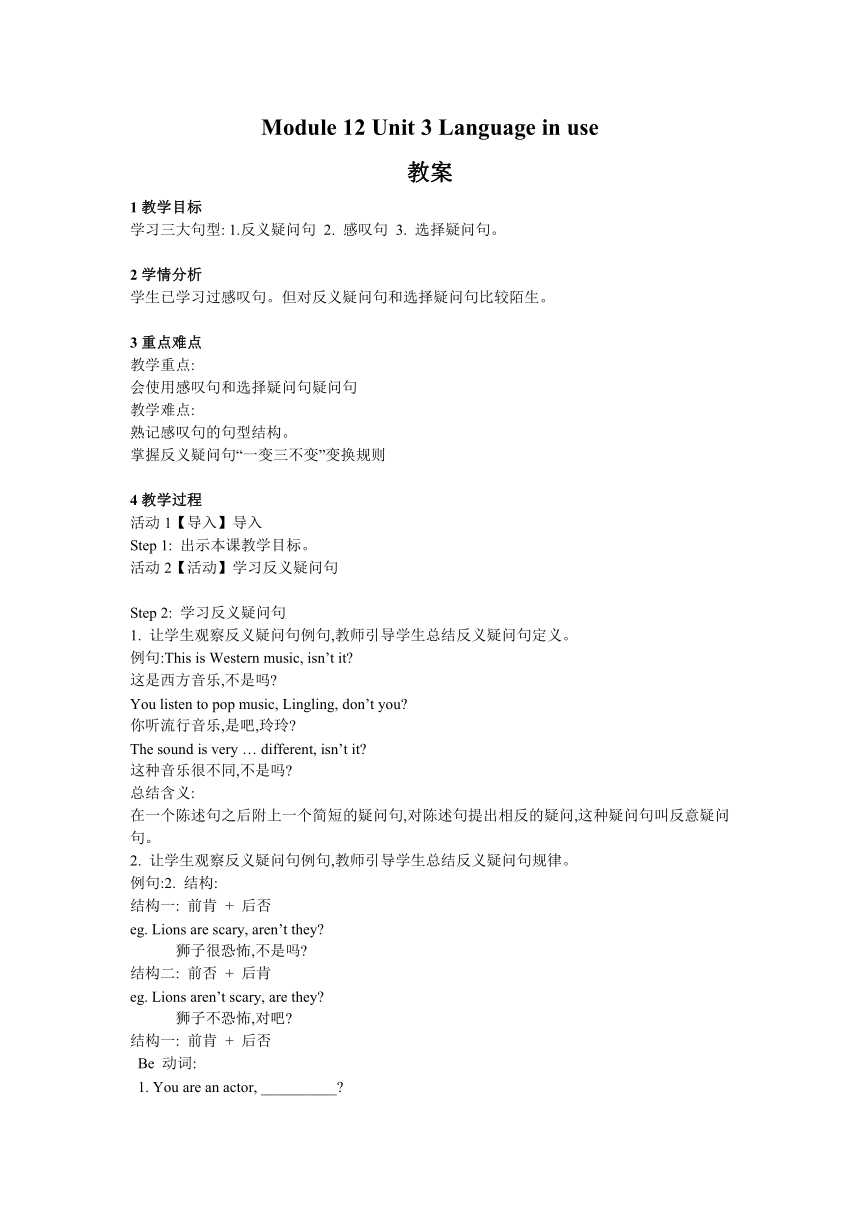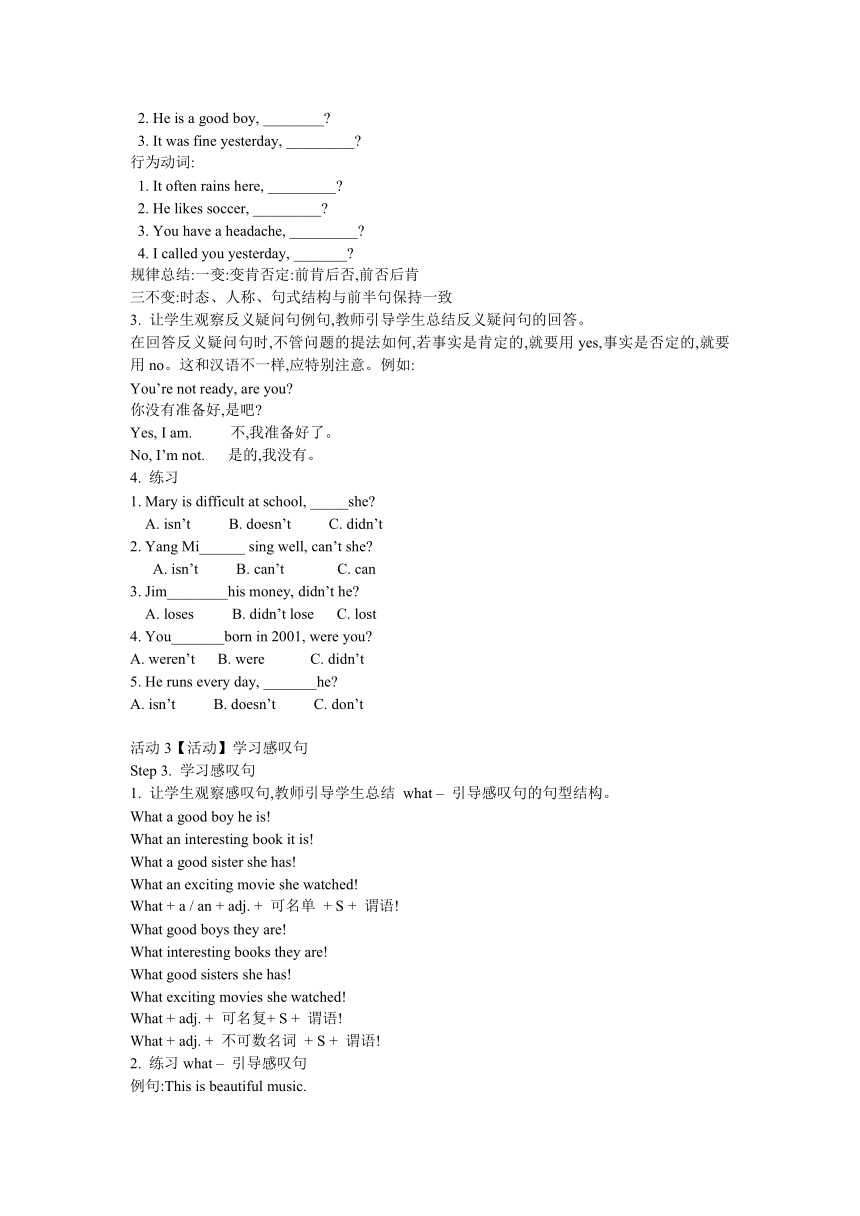Module 12 Unit 3 Language in use 教案
文档属性
| 名称 | Module 12 Unit 3 Language in use 教案 |

|
|
| 格式 | zip | ||
| 文件大小 | 119.9KB | ||
| 资源类型 | 教案 | ||
| 版本资源 | 外研版 | ||
| 科目 | 英语 | ||
| 更新时间 | 2017-02-13 00:00:00 | ||
图片预览


文档简介
Module
12
Unit
3
Language
in
use
教案
1教学目标
学习三大句型:
1.反义疑问句
2.
感叹句
3.
选择疑问句。
2学情分析
学生已学习过感叹句。但对反义疑问句和选择疑问句比较陌生。
3重点难点
教学重点:
会使用感叹句和选择疑问句疑问句
教学难点:
熟记感叹句的句型结构。
掌握反义疑问句“一变三不变”变换规则
4教学过程
活动1【导入】导入
Step
1:
出示本课教学目标。
活动2【活动】学习反义疑问句
Step
2:
学习反义疑问句
1.
让学生观察反义疑问句例句,教师引导学生总结反义疑问句定义。
例句:This
is
Western
music,
isn’t
it
这是西方音乐,不是吗
You
listen
to
pop
music,
Lingling,
don’t
you
你听流行音乐,是吧,玲玲
The
sound
is
very
…
different,
isn’t
it
这种音乐很不同,不是吗
总结含义:
在一个陈述句之后附上一个简短的疑问句,对陈述句提出相反的疑问,这种疑问句叫反意疑问句。
2.
让学生观察反义疑问句例句,教师引导学生总结反义疑问句规律。
例句:2.
结构:
结构一:
前肯
+
后否
eg.
Lions
are
scary,
aren’t
they
狮子很恐怖,不是吗
结构二:
前否
+
后肯
eg.
Lions
aren’t
scary,
are
they
狮子不恐怖,对吧
结构一:
前肯
+
后否
Be
动词:
1.
You
are
an
actor,
__________
2.
He
is
a
good
boy,
________
3.
It
was
fine
yesterday,
_________
行为动词:
1.
It
often
rains
here,
_________
2.
He
likes
soccer,
_________
3.
You
have
a
headache,
_________
4.
I
called
you
yesterday,
_______
规律总结:一变:变肯否定:前肯后否,前否后肯
三不变:时态、人称、句式结构与前半句保持一致
3.
让学生观察反义疑问句例句,教师引导学生总结反义疑问句的回答。
在回答反义疑问句时,不管问题的提法如何,若事实是肯定的,就要用yes,事实是否定的,就要用no。这和汉语不一样,应特别注意。例如:
You’re
not
ready,
are
you
你没有准备好,是吧
Yes,
I
am.
不,我准备好了。
No,
I’m
not.
是的,我没有。
4.
练习
1.
Mary
is
difficult
at
school,
_____she
A.
isn’t
B.
doesn’t
C.
didn’t
2.
Yang
Mi______
sing
well,
can’t
she
A.
isn’t
B.
can’t
C.
can
3.
Jim________his
money,
didn’t
he
A.
loses
B.
didn’t
lose
C.
lost
4.
You_______born
in
2001,
were
you
A.
weren’t
B.
were
C.
didn’t
5.
He
runs
every
day,
_______he
A.
isn’t
B.
doesn’t
C.
don’t
活动3【活动】学习感叹句
Step
3.
学习感叹句
1.
让学生观察感叹句,教师引导学生总结
what
–
引导感叹句的句型结构。
What
a
good
boy
he
is!
What
an
interesting
book
it
is!
What
a
good
sister
she
has!
What
an
exciting
movie
she
watched!
What
+
a
/
an
+
adj.
+
可名单
+
S
+
谓语!
What
good
boys
they
are!
What
interesting
books
they
are!
What
good
sisters
she
has!
What
exciting
movies
she
watched!
What
+
adj.
+
可名复+
S
+
谓语!
What
+
adj.
+
不可数名词
+
S
+
谓语!
2.
练习what
–
引导感叹句
例句:This
is
beautiful
music.
改:What
beautiful
music
this
is!
Vienna
is
a
beautiful
old
city.
改:What
a
beautiful
old
city
Vienna
is!
It
is
a
successful
concert.
改:What
a
successful
concert
it
is!
3.
They
are
playing
noisy
drums.
改:What
noisy
drums
they
are
playing!
4.
It
was
a
wonderful
party.
改:
What
a
wonderful
party
it
was!
Mozart
is
a
famous
composer.
改:What
a
famous
composer
Mozart
is!
让学生观察感叹句,教师引导学生总结
how–
引导感叹句的句型结构。
结构一:How
+形容词/
副词+主语+谓语!”。
如:How
careful
she
is!
How
fast
he
runs!
她多么细心啊!
他跑得多快呀!
1.她多漂亮啊!
How
beautiful
she
is!
2.
天多热呀!
How
hot
it
is!
3.
声音多特别啊!
How
different
the
sound
is!
4.
他唱的多好呀!
How
well
he
sings!
How
beautiful
a
girl
she
is!
How
clever
a
boy
he
is!
How
wonderful
books
she
has!
How
difficult
the
music
he
wrote!
How
different
the
voice
she
has!
结构二:How
+
adj
+
a
/
an
+
可数名词单数
+
S
+
谓语
!
How
+
adj
+
可数名词复数
/
不可数名词
+
S
+谓!
练习感叹句
1.
Mo
Yan
won
the
Nobel
Prize
for
Literature
last
year.
________
excellent
he
is!
A.
How
B.
What
C.
What
a
D.
What
an
2.-So
many
people
like
to
watch
The
Voice
of
China.
-________
wonderful
it
is!
I
like
it
very
much.
A.
How
B.
What
C.
What
an
3.—______
delicious
the
beef
is!
—I’m
glad
you
like
it.
A.
How
B.
How
a
C.
What
D.
What
a
4.____dangerous
it
is
to
ride
fast
on
a
busy
road!
A.
What
B.
What
a
C.
How
D.
How
a
活动4【活动】学习选择疑问句
Step
4:
学习选择疑问句:
学生观察例句,老师引导学生总结反义疑问句定义。
1.Do
you
like
traditional
Western
music
or
pop
music
2.
Is
this
by
Strauss
or
Mozart
定义:
在问题中提供两个或两个以上可选答案的问句叫选择疑问句。
选择疑问句练习:
例:you
/
like
/
pop
/
traditional
music
Do
you
like
pop
or
traditional
music
(be)
/
Strauss
/
German
/
Austrian
Is
Strauss
German
or
Austrian
2.
(be)
/
this
/
pop
/
rock
Is
this
pop
or
rock
3.
they
/
play
/
traditional
music
/
modern
music
Do
they
play
traditional
music
or
modern
music
4.
he
/
play
/
piano
/
violin
Does
he
play
the
piano
or
the
violin
5.
where
/
(can)
we
/
hear
/
rock
music
/
in
/
New
York
/
London
Where
can
we
hear
rock
music,
in
New
York
or
in
London
活动5【练习】完成练习
Step5:
Finish
the
exercise
on
page
77.
12
Unit
3
Language
in
use
教案
1教学目标
学习三大句型:
1.反义疑问句
2.
感叹句
3.
选择疑问句。
2学情分析
学生已学习过感叹句。但对反义疑问句和选择疑问句比较陌生。
3重点难点
教学重点:
会使用感叹句和选择疑问句疑问句
教学难点:
熟记感叹句的句型结构。
掌握反义疑问句“一变三不变”变换规则
4教学过程
活动1【导入】导入
Step
1:
出示本课教学目标。
活动2【活动】学习反义疑问句
Step
2:
学习反义疑问句
1.
让学生观察反义疑问句例句,教师引导学生总结反义疑问句定义。
例句:This
is
Western
music,
isn’t
it
这是西方音乐,不是吗
You
listen
to
pop
music,
Lingling,
don’t
you
你听流行音乐,是吧,玲玲
The
sound
is
very
…
different,
isn’t
it
这种音乐很不同,不是吗
总结含义:
在一个陈述句之后附上一个简短的疑问句,对陈述句提出相反的疑问,这种疑问句叫反意疑问句。
2.
让学生观察反义疑问句例句,教师引导学生总结反义疑问句规律。
例句:2.
结构:
结构一:
前肯
+
后否
eg.
Lions
are
scary,
aren’t
they
狮子很恐怖,不是吗
结构二:
前否
+
后肯
eg.
Lions
aren’t
scary,
are
they
狮子不恐怖,对吧
结构一:
前肯
+
后否
Be
动词:
1.
You
are
an
actor,
__________
2.
He
is
a
good
boy,
________
3.
It
was
fine
yesterday,
_________
行为动词:
1.
It
often
rains
here,
_________
2.
He
likes
soccer,
_________
3.
You
have
a
headache,
_________
4.
I
called
you
yesterday,
_______
规律总结:一变:变肯否定:前肯后否,前否后肯
三不变:时态、人称、句式结构与前半句保持一致
3.
让学生观察反义疑问句例句,教师引导学生总结反义疑问句的回答。
在回答反义疑问句时,不管问题的提法如何,若事实是肯定的,就要用yes,事实是否定的,就要用no。这和汉语不一样,应特别注意。例如:
You’re
not
ready,
are
you
你没有准备好,是吧
Yes,
I
am.
不,我准备好了。
No,
I’m
not.
是的,我没有。
4.
练习
1.
Mary
is
difficult
at
school,
_____she
A.
isn’t
B.
doesn’t
C.
didn’t
2.
Yang
Mi______
sing
well,
can’t
she
A.
isn’t
B.
can’t
C.
can
3.
Jim________his
money,
didn’t
he
A.
loses
B.
didn’t
lose
C.
lost
4.
You_______born
in
2001,
were
you
A.
weren’t
B.
were
C.
didn’t
5.
He
runs
every
day,
_______he
A.
isn’t
B.
doesn’t
C.
don’t
活动3【活动】学习感叹句
Step
3.
学习感叹句
1.
让学生观察感叹句,教师引导学生总结
what
–
引导感叹句的句型结构。
What
a
good
boy
he
is!
What
an
interesting
book
it
is!
What
a
good
sister
she
has!
What
an
exciting
movie
she
watched!
What
+
a
/
an
+
adj.
+
可名单
+
S
+
谓语!
What
good
boys
they
are!
What
interesting
books
they
are!
What
good
sisters
she
has!
What
exciting
movies
she
watched!
What
+
adj.
+
可名复+
S
+
谓语!
What
+
adj.
+
不可数名词
+
S
+
谓语!
2.
练习what
–
引导感叹句
例句:This
is
beautiful
music.
改:What
beautiful
music
this
is!
Vienna
is
a
beautiful
old
city.
改:What
a
beautiful
old
city
Vienna
is!
It
is
a
successful
concert.
改:What
a
successful
concert
it
is!
3.
They
are
playing
noisy
drums.
改:What
noisy
drums
they
are
playing!
4.
It
was
a
wonderful
party.
改:
What
a
wonderful
party
it
was!
Mozart
is
a
famous
composer.
改:What
a
famous
composer
Mozart
is!
让学生观察感叹句,教师引导学生总结
how–
引导感叹句的句型结构。
结构一:How
+形容词/
副词+主语+谓语!”。
如:How
careful
she
is!
How
fast
he
runs!
她多么细心啊!
他跑得多快呀!
1.她多漂亮啊!
How
beautiful
she
is!
2.
天多热呀!
How
hot
it
is!
3.
声音多特别啊!
How
different
the
sound
is!
4.
他唱的多好呀!
How
well
he
sings!
How
beautiful
a
girl
she
is!
How
clever
a
boy
he
is!
How
wonderful
books
she
has!
How
difficult
the
music
he
wrote!
How
different
the
voice
she
has!
结构二:How
+
adj
+
a
/
an
+
可数名词单数
+
S
+
谓语
!
How
+
adj
+
可数名词复数
/
不可数名词
+
S
+谓!
练习感叹句
1.
Mo
Yan
won
the
Nobel
Prize
for
Literature
last
year.
________
excellent
he
is!
A.
How
B.
What
C.
What
a
D.
What
an
2.-So
many
people
like
to
watch
The
Voice
of
China.
-________
wonderful
it
is!
I
like
it
very
much.
A.
How
B.
What
C.
What
an
3.—______
delicious
the
beef
is!
—I’m
glad
you
like
it.
A.
How
B.
How
a
C.
What
D.
What
a
4.____dangerous
it
is
to
ride
fast
on
a
busy
road!
A.
What
B.
What
a
C.
How
D.
How
a
活动4【活动】学习选择疑问句
Step
4:
学习选择疑问句:
学生观察例句,老师引导学生总结反义疑问句定义。
1.Do
you
like
traditional
Western
music
or
pop
music
2.
Is
this
by
Strauss
or
Mozart
定义:
在问题中提供两个或两个以上可选答案的问句叫选择疑问句。
选择疑问句练习:
例:you
/
like
/
pop
/
traditional
music
Do
you
like
pop
or
traditional
music
(be)
/
Strauss
/
German
/
Austrian
Is
Strauss
German
or
Austrian
2.
(be)
/
this
/
pop
/
rock
Is
this
pop
or
rock
3.
they
/
play
/
traditional
music
/
modern
music
Do
they
play
traditional
music
or
modern
music
4.
he
/
play
/
piano
/
violin
Does
he
play
the
piano
or
the
violin
5.
where
/
(can)
we
/
hear
/
rock
music
/
in
/
New
York
/
London
Where
can
we
hear
rock
music,
in
New
York
or
in
London
活动5【练习】完成练习
Step5:
Finish
the
exercise
on
page
77.
同课章节目录
- Module 1 Lost and found
- Unit 1 Whose bag is this?
- Unit 2 Are they yours?
- Unit 3 Language in use
- Module 2 What can you do ?
- Unit 1 I can play the piano
- Unit 2 I can run really fast
- Unit 3 Language in use
- Module 3 Making plans
- Unit 1 What are you going to do at the weekends?
- Unit 2 We're going to cheer the players.
- Unit 3 Language in use
- Module 4 Life in the future
- Unit 1 Everyone will study at home
- Unit 2 Every family will have a small plane.
- Unit 3 Language in use
- Module 5 Shopping
- Unit 1 What can I do for you?
- Unit 2 You can buy everything on the Internet
- Unit 3 Language in use
- Module 6 Around town
- Unit 1 Could you tell me how to get to the Nationa
- Unit 2 The London Eye is on your right.
- Unit 3 Language in use
- Revision module A
- Module 7 My past life
- Unit 1 I was born in a small village.
- Unit 2 I was born in Quincy.
- Unit 3 Language in use
- Module 8 Story time
- Unit 1 Once upon a time….
- Unit 2 Goldilocks hurried out of the house.
- Unit 3 Language in use
- Module 9 Life history
- Unit 1 He left school and began work at the age of
- Unit 2 He decided to be an actor.
- Unit 3 Language in use
- Module 10 A holiday journey
- Unit 1 What did you do?
- Unit 2 This morning we took a walk.
- Unit 3 Language in use
- Module 11 Body language
- Unit 1 They touch noses!
- Unit 2 Here are some ways to welcome them.
- Unit 3 Language in use
- Module 12 Western music
- Unit 1 It's so beautiful!
- Unit 2 Vienna is the centre of European classical
- Unit 3 Language in use
- Revision module B
